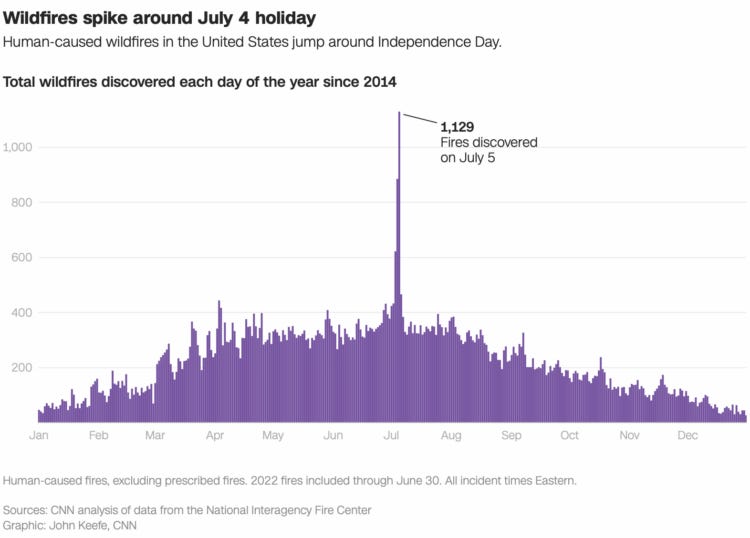Out with a Bang
Fireworks are uniquely harmful to wildlife. Let's find a less selfish way to amuse ourselves.
I confess to a touch of cowardice in raising the subject of the harm fireworks inflict on wildlife and domestic animals. Being an environmentalist often exposes oneself to accusations of fun busting, and these accusations are not entirely wrong. After all, one man’s fun can be another man’s ecological disaster. “At long last,” you may argue, “leave me to my climate-destroying hamburger.” (Further confession: I do still eat hamburgers.)
So, not wishing to appear the scold, I put off writing this piece until after July 4. I hope you enjoyed your fireworks. May they be your last.
Living a mile from Longwood Gardens, which sometimes combines massive fireworks with their spectacular nighttime fountain shows, we have been subjected to sudden clatter on certain summer nights for more than a decade. One of our dogs is a rescue named Apollo. Let’s pause to allow him to sit for his portrait:
Generally a pretty mellow guy (unless you’re wearing a delivery uniform), Apollo is terrified by loud noises, including exploding fireworks and claps of thunder. Maybe his hearing is especially sensitive or maybe he’s neurotic, but he is not alone.
Dogs hear three times better than humans, and, according to Kendra Coulter, author of Defending Animals: Finding Hope on the Front Lines of Animal Protection, up to fifty percent of them fear fireworks. The Animal Ethics website says, “Noises caused by fireworks and firecrackers can lead to loss of hearing and tinnitus. Dogs are known to suffer irreversible hearing loss caused by proximity to the noise of gunfire.”
At least my dog can go hide in the closet when humans indulge in the meretricious thrill of loud explosions and bursts of light. Most animals live outside.
Coulter reports that “Horses’ innate fear responses can take over when they hear fireworks. This led to the tragic death of a horse in Nova Scotia in 2022, neither the first nor last related equine casualty." Deer, already a menace on our roads, can be startled into reckless flight. Cattle have been known to crash through fences in their panic.
For years, pyrotechnic displays have had me thinking of those small flying mammals who seem to be disappearing from our skies. Imagine the impact of fireworks on bats trying to navigate at night with the acute hearing they use for echolocation. You will have to imagine it since humans have scarcely studied the phenomenon, but I doubt very much that mid-air explosions net out positive for the bats. Freshfields Animal Rescue in the UK asserts that bats and owls, as well as birds living in aviaries, “often die of shock” from the sound of fireworks.
Coulter notes that:
The dangers are serious for wild animals like birds, squirrels, frogs and fish too. During fireworks explosions, nearby resting birds will flee in fear en masse from trees and ponds, and fly off into the night sky.
Some birds have flown so far out to sea, they would not physically have been able to return to land alive. Birds can crash into buildings, get lost and disoriented and literally fall, by the thousands, onto communities.
Furthermore:
In spring and early summer, when animals like birds and squirrels are nesting or in the early stages of rearing their offspring, the risks are even greater. Babies die of dehydration or starvation when terrified or disoriented animal parents cannot find their way back to their nests and burrows. These painful deaths are particularly tragic because they are completely avoidable.
“Completely avoidable” indeed. So is the pollution fireworks cause. The New York Times recently reported on the harm to humans of “particulate matter, the same type of pollution that is elevated from wildfire smoke. While there’s not much research on the risks of fireworks specifically, particulate matter less than 2.5 microns wide (about one-30th the width of a human hair) is known to enter people’s lungs and bloodstreams and cause breathing problems and inflammation.” Of course, other animals have lungs, too. And they may try to eat toxic fireworks detritus or use it to build nests, thus exposing their offspring.
But the biggest harm to wildlife is usually habitat destruction, and so it is with fireworks, which every year cause a spike in wildfires. As you can see in this chart from CNN, the number of wildfires in the U.S. goes parabolic around the Fourth of July. No other date comes close:
I know you’re going to be careful not to light the world on fire with your fireworks. Right. And I’m only buying hamburger from cows that don’t fart.
Instead of pretending to care, how about we resolve to control what we can control, especially when doing so may avoid harm to others. One of the things we can control is our impulse to blow stuff up in the night sky for cheap thrills.
Henceforth, let’s declare our independence from fireworks. Don’t buy them. Don’t go to the show. Lots of little guys you never met will thank you. Your dog will, too.




